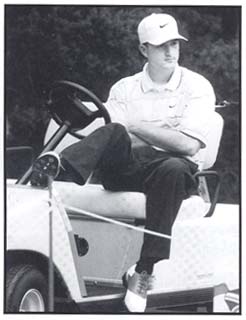
Casey Martin at the Nike Greater Austin
Open, March 7, 1998
|
Two recent federal court decisions related to the use of golf carts in professional competition have produced significantly different outcomes. The U.S. Ninth Circuit Court of Appeals (March 6, 2000) in San Francisco upheld a lower court's decision that Casey Martin, who had been diagnosed with a degenerative circulatory disorder of his right leg, should be allowed to use a golf cart on the Professional Golf Association (PGA) Tour (Case Number 98-35309).
A day later, however, the U.S. Seventh Circuit Court of Appeals in Chicago denied Ford Olinger the right to use a golf cart in the United States Golf Association (USGA) sponsored tournament-the U.S. Open. Olinger, also recognized nationally as a highly skilled golfer, plays with a severe degenerative condition, significantly impairing his ability to walk (Case Number 99-2580). There is no dispute that both Martin and Olinger have profound disabilities. Both golfers sued under Title TII of the Americans with Disabilities Act (ADA).
In the Martin case, the U.S. Ninth Circuit Court of Appeals' 3-0 fuling held that providing Casey Martin the use of a golf cart is reasonable. Golf carts are, in fact, used in other competitions such as the first two stages of the PGA Tour qualifying school competition and the Senior Tour. In these events, the PGA Tour assigns no handicap penalty to those who ride, as opposed to those who walk.
The issue on which most of the dispute centers is whether permitting the use of a golf cart will fundamentally alter the PGA Tour. In Martin's favor, the Court ruled that walking is not essential to the generalized game of golf. From their position, the PGA Tour argued that it is not offering the generalized game of golf, it is offering a particular competition.
The PGA Tour also points out that the purpose of requiring players to walk injects a fatigue factor into the shot-making capacity of players, while permitting a player to ride alters the competition. The Court found that the fatigue factor injected into the game of golf by walking the courses cannot be deemed significant under normal circumstances (Casey Martin vs PGA Tour, Case Number 9835309, March 6, 2000).
In contrast, the U.S. Seventh Circuit Court of Appeals' 3-0 ruling found that providing a golf cart to Ford Olinger during the U.S. Open would result in a fundamental alteration of this elite professional golf competition. As part of its findings, the U.S. Seventh Circuit Court of Appeals concluded that the nature of golf competition would be fundamentally altered if the walking rule were eliminated, because it would remove stamina from the set of qualities designed to be tested at this level of competition. In essence, this Court was saying that performance in golf includes the golfer's ability to cope with the fatigue borne of hills, heat, and humidity (Ford Olinger v United States Golf Association, Case Number 99-2580, March 7, 2000).
Since 1955, the U.S. Open has required players to walk. The USGA maintains the same standard, because it believes that physical endurance and stamina are essential parts of the competition. From 1986 to the present, the USGA has received 12 requests to waive prohibition of golf cart usage in the U.S. Open. To date, only Casey Martin (1998) has ever ridden a golf cart while playing in the U.S. Open.
In light of these significantly different outcomes, the PGA Tour will continue to review the options over the next few months, including the possibility of asking the Supreme Court to hear the Casey Martin case (USA Today, March 16, 2000), In the interim, Casey Martin will be permitted to use a golf cart in PGA Tour competition, while all other competitors on the Tour will be required to adhere to the walking rule. Before rushing directly to the Supreme Court, it would appear prudent for the PGA Tour to take time to reflect on the two judicial decisions and to seek additional counsel. The challenge the PGA Tour Board faces is formidable-can it reconcile these diverse opinions? Can a strategy be developed to enable Casey Martin and others with comparable conditions to play, while at the same time upholding the Tour's key historical principles that govern professional golf for non-disabled individuals?